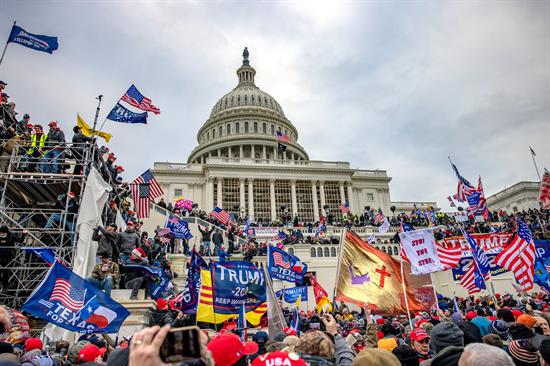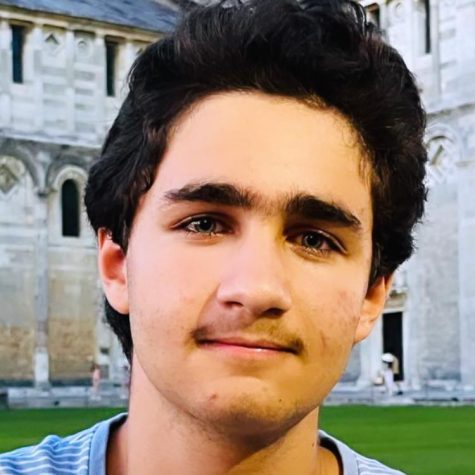January 6: One Year Later
The first anniversary of the January 6th attack at the U.S Capitol

A view of the United States Capitol Building surrounded by rioters and insurrectionists on January 6, 2021
January 8, 2022
Democracy Standing Tall
January 6, 2021. Senator James Lankford (R-OK) is objecting to the confirmation of the electoral ballots, when he is interrupted by Senator Chuck Grassley (R-IA) who is notified of the fact that protesters have breached the United States capitol. That day went on to bring some of the most unprecedented and grotesque moments in this country’s history. It led to a second impeachment of former President Trump, the death of several police officers defending the capitol (two by suicide,) and a historical moment that will be remembered in the history books. On Thursday, January 6th, a year after the attack, Congressional Democrats came together to remember the riot, or as it is commonly referred to as the ‘Capitol Insurrection.’ According to CNN, the only republicans to attend were Wyoming congresswoman Liz Cheney, an outspoken critic of the insurrection as well as her father and former Vice President, Dick Cheney. Vice President Cheney said he came to the Capitol because the insurrection is an “Important historical event, you can’t overestimate how important it is,” he told the press. He also mentioned how he did not recognize the GOP and its leadership. “I’m deeply disappointed we don’t have better leadership in the Republican Party to restore the Constitution,” he added. The House of Representatives held a moment of silence for the fallen heroes of the historical day, as well as a moderated conservation with prominent historians such as Jon Meacham, and Doris Kearns Goodwin. In the evening, the same Congressional Democrats (and the Cheneys) held a prayer vigil outside the capitol building, with the same purpose of remembrance and commemoration. Senator Amy Klobuchar (D-MN) also talked about the difficulties of the day, but ultimately emphasized how democracy prevailed. “Our democracy stood tall and won,” Klobuchar told Jake Tapper on CNN.
A Battle for the Soul of America
President Biden spoke earlier that morning at the Capitol, not pulling any punches, referring to the capitol insurrection as “a dagger at the throat of America.” “For the first time in our history, a president has not just lost an election. He tried to prevent the peaceful transfer of power.” Mr. Biden, of course speaking there of his predecessor Donald Trump, also spoke of the horrid images seen from the attack a year ago. “A mob, breaking windows, kicking in doors, breaching the capitol. American flags on poles being used as weapons, as spheres, fire extinguishers being thrown at the heads of police officers. A crowd that professes their love for law enforcement assaulted those police officers.” Biden made it particularly clear who he blamed for the violence that occurred on that day. “He’s not just the former president, he’s the defeated former president,” Biden said, after rebuking the ‘big lie’ that the election was stolen from Donald Trump in 2020. “There is simply no proof that the election results were inaccurate,” he stated. Biden believes that the country is fighting for it’s “soul” and for its democracy. “We’re engaged anew in a struggle between democracy and autocracy, between the aspirations of the many, and the greed of the few.” “We are in a battle for the soul of America. A battle that by the grace of God and the goodness and greatness of this nation we will win.”
Investigation and Accountability
The House Select Committee on the January 6th attack was created in July to investigate the insurrection on the U.S capitol last year, now engaging in some of its most aggressive activities, even voting on the recommendation to hold Mark Meadows, Mr. Trump’s former chief of staff, in criminal contempt. The leaders of the committee, Chair Bennie Thompson (D-MS) and Vice-Chair Liz Cheney (R-WY), sat down with CNN the night of the anniversary to discuss the committee’s progress in the investigation. “It’s our democracy that’s at risk more than anything else. It’s not about Democrat[s] or Republican[s],” said Chairman Thompson. They both stressed the importance of the committee, and making sure that everyone is held accountable. Both those who perpetrated the capitol and those who incited it. Cheney emphasized her belief of Mr. Trump’s responsibility in the attacks as well. “We’ve never before been in a situation where the president himself provoked a violent assault on this capitol building.” Cheney believes that the behavior and rhetoric of the former president was dangerous and a “betrayal of their oath of office.” Chairman Thompson ended with the result of the investigation, saying “The body of work will be thorough, and I can tell you that the public will have an opportunity to review it. We won’t take sides.”
One Day, Three Rings
One story from the day of the insurrection comes from congressman Jamie Raskin (D-MD) who came to the capital to perform his duty and certify the election results on January 6th 2021, just days after his son’s tragic death. Raskin said that he was not afraid on January 6th. “I personally felt no fear because the very worst thing that ever could have happened to me had already happened to me,” he told Fresh Air on WHYY & NPR on January 4th. Mr. Raskin said he sees January 6th as three rings of activity. He views the outer ring consisting of thousands of people as a wild protest. The second ring is how he views the “insurrection itself” consisting of white supremacists groups as well as militias, fueling and propelling the events of that day. He describes the inner ring as the “realm of the coup.” “And that was an attempt to essentially steal away the presidential election results and to preserve [Trump] in power for another four years,” he stated. Raskin later became the lead impeachment manager for the second impeachment of Donald Trump in 2021. Raskin now sits on the January 6th committee chaired by Bennie Thompson. His new book, Unthinkable: Trauma, Truth, and the Trials of American Democracy, goes through his grief at the loss of his son, and the dangers for the democracy of the U.S. after the insurrection.
A Lesson in History
January 6th was a day of great difficulty for many. Officers, members of congress, staffers, the press, and countless others. Many officers believed that the attack was baseless. As Commander Ramey Kyle of the Metropolitan PD plainly said, it was “just all for nothin.” Capitol police officer Michael Fanone says that one of the corridors he defended during the riot felt like a “warzone,” and was unrecognizable to him upon his visit back to the capitol on the attack’s anniversary. That day also saw journalists on capitol hill attacked as well as their equipment. Cameras and recording equipment from the AP smashed and vandalized by rioters. Members of Congress and staffers hid for their lives in offices against fierce and angry crowds, using file cabinets and desks as their defense. Vice President Kamala Harris even compared the day to certain terrorist attacks the U.S experienced in history, such as the attack on Pearl Harbor and the attacks of September 11th, 2001. January 6th is a date which will live on in the history books as a test of the United State’s democracy and its resilience, as well as a lesson to those who hold power in its democratic system.

